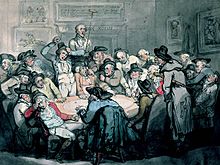Basset (card game)

Thomas Rowlandson painted his version of a gaming den in "The Hazard Room". On the walls is a bouquet of gambler’s delights: boxing, horse racing, the odds of the day, and the patron saint of card games, Edmond Hoyle.
|
|
| Origin | Italian |
|---|---|
| Type | card game |
| Players | Np. |
| Skills required | Counting |
| Cards | 52 |
| Deck | Anglo-American |
| Play | Clockwise |
| Playing time | 10–15 min. |
| Random chance | Medium |
| Related games | |
| Baccarat | |
Basset (French bassette, from the Italian bassetta), also known as barbacole and hocca, is a gambling card game that was considered one of the most polite. It was intended for persons of the highest rank because of the great losses or gains that might be accrued by players.
According to DELI (Dizionario etimologico della lingua italiana), the word Basetta is first recorded in the first half of the 15th century. The game Basset is described by a few authors as having been invented in 1593 by a noble Venetian named Pietro Cellini, who was punished with exile in Corsica for his contrivance. It may have probably been devised out of the game of Hocca, Hoca or even Hoc, considered the precursor and an outlawed form of Italian roulette at which people lost considerable sums of money and also an early iteration of Biribi, which was brought into fashion by Cardinal Mazarin.
Basset was first introduced into France by Signior Justiniani, ambassador of Venice, in 1674. The game was very popular at the court of King Charles II, and even after 15 January 1691 when Louis XIV issued an order from the privy council, by which he expressly forbade not only the officers belonging to his array, but likewise all other persons of whatever sex or denomination to play at Hoca, Pharaoh, Barbacole and Basset. The sums of money lost in France at this game were so considerable that the nobility were in danger of being undone after many persons of distinction were ruined. Later the law against gambling was tightened eluding which they disguised Basset under the name of "pour and contre", that is, "for and against".
By the constitution of Basset, large advantages were secured to the tailleur (the dealer / keeper of the bank) and so vast were their gains, that the privilege of keeping a bank at Basset, where the stakes were unlimited, was granted only to cadets or other members of great families. It was basically certain that a considerable fortune could be realised by the tailleur in a short time. The advantages of the dealer arise in many ways, but mainly from the temptations for adventurous players to increase their stakes on certain desperate chances, which rarely turn up, and which in the long run told largely in favour of the bank. Where licenses were otherwise conceded for keeping a public Basset table in France, the stakes were strictly limited to twelve pence.
Basset migrated to England in about 1677, introduced by a croupier called Morin, but never caught on outside Court circles on account of its costliness and the heavy risks it entailed on the players. Its heyday seems to have been in the early 18th century. It has no place in Cotton's 1674 The Complete Gamester, but rates a lengthy entry in the 1721 edition where the fierceness of the gambling is stressed. It is there described as a "French Game", presumably because it was imported from France. The game's high stakes, along with its devastations, is the subject of Susanna Centlivre's 1705 comedy The Basset Table.
...
Wikipedia
